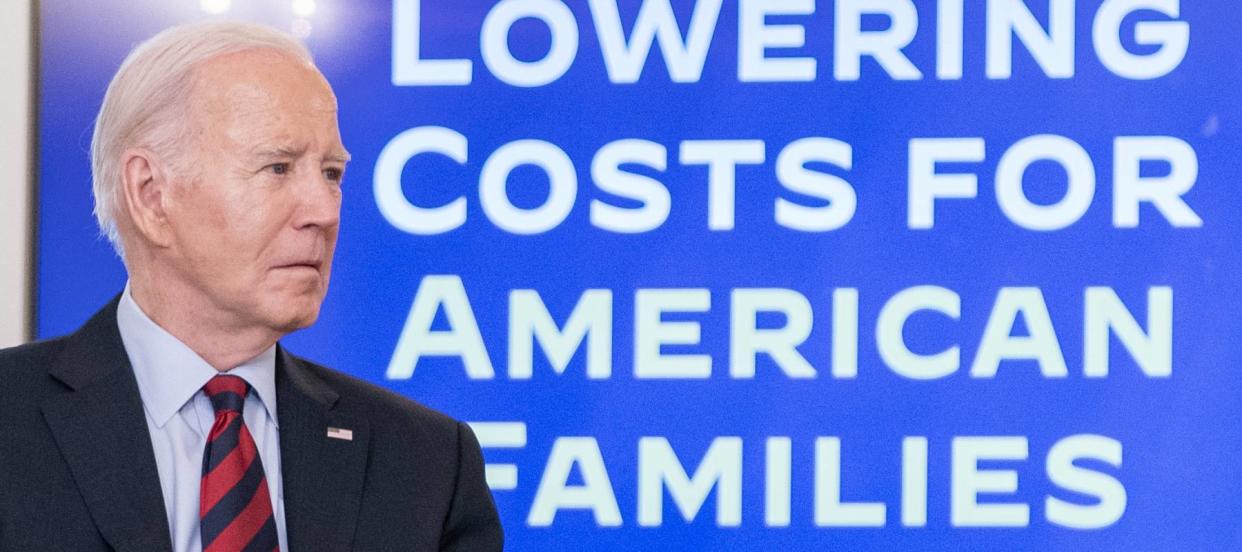‘Charging hardworking Americans’: Biden's regulators just cut credit card late penalties from $32 to $8, calling them ‘junk fees’ — but critics say the rule will 'raise rates'. Who's right?

The Biden administration has announced it will be setting a new ceiling on credit card late fees, a move that regulators predict could save Americans up to $10 billion a year.
The finalized regulation, which the Consumer Financial Protection Bureau (CFPB) first proposed last year, will cap most credit card late fees at $8, down from the current average of $32.
Don’t miss
'It's not taxed at all': Warren Buffett shares the 'best investment' you can make when battling hot inflation — take advantage today
'We're looking at a downsized America': Kevin O'Leary warns any new house, car you enjoy will be significantly 'smaller' — what he means and how to protect yourself in 2024
Suze Orman: If you think you're ready to retire, think again — here are 3 quick and simple money moves to avoid being poor when you stop working
Although the CARD Act of 2009 called for limits on late fees and more consumer protection, an immunity provision granted by the Federal Reserve Board of Governors allowed card companies to escape enforcement, until now.
“For over a decade, credit card giants have been exploiting a loophole to harvest billions of dollars in junk fees from American consumers,” said CFPB Director Rohit Chopra in a news release.
“Today's rule ends the era of big credit card companies hiding behind the excuse of inflation when they hike fees on borrowers and boost their own bottom lines.”
But some critics say the late-fee limit will hurt American consumers more than it will help. Here’s why.
Excessive fees are exacerbating consumer debt
Every time you miss your monthly credit card payment, you’re likely getting hit with a late fee from your issuer — which can be as high as $41. On top of that, your credit score takes a hit, your interest rate could climb on future purchases and your creditor may potentially end any promotional interest rate.
These late penalties hit households living paycheck-to-paycheck particularly hard — rather than being a “meaningful incentive to make on-time payments”, according to the CFPB.
President Biden said at a meeting of his competition council earlier this week that the current late fees are generating five times more money than credit card companies spend to collect late payments.
“They're padding their profit margins and charging hardworking Americans more,” he said. “It's a lot of money."
The CFPB says it will be reducing late fees down to $8 and curbing automatic inflation adjustments at large credit card issuers that have more than one million accounts and represent over 95% of total outstanding credit card debt.
It also notes these issuers may still be able to charge fees above the cap if they can prove the higher fee is necessary to cover their collection costs.
Read more: ‘The biggest crash in history': Robert Kiyosaki warns that millions of 401(k)s and IRAs will be 'toast' — here are 3 shockproof assets he likes for protection
Critics say there may be major consequences
While many consumer advocates are celebrating, not everyone’s pleased by the new regulation.
“It will decrease the availability of credit card products for those who need it most, raise rates for many borrowers who carry a balance but pay on time, and increase the likelihood of late payments across the board,” South Carolina Senator Tim Scott, a Republican, warned in a statement
The Chamber of Commerce also plans to file a lawsuit to try to prevent the regulation from going into effect.
“The Consumer Financial Protection Bureau has exceeded its authority," said Neil Bradley, the chamber's executive vice president and chief policy officer.
"The agency’s final credit card late fee rule punishes Americans who pay their credit card bills on time by forcing them to pay for those who don’t."
What to read next
Here's the annual income you need to fall in America's lower, middle, and upper class — plus 3 easy tips to rocket you up the ladder
'The worst investment people can make': Real estate guru Grant Cardone says too many Americans are chasing the dream of home ownership. Do this 1 simple thing for bigger riches instead
‘Difficult to stomach’: Rich, young Americans are ditching the dream of homeownership as housing costs hit new highs — how to easily capitalize on US real estate without having to make suffocating mortgage payments
This article provides information only and should not be construed as advice. It is provided without warranty of any kind.
